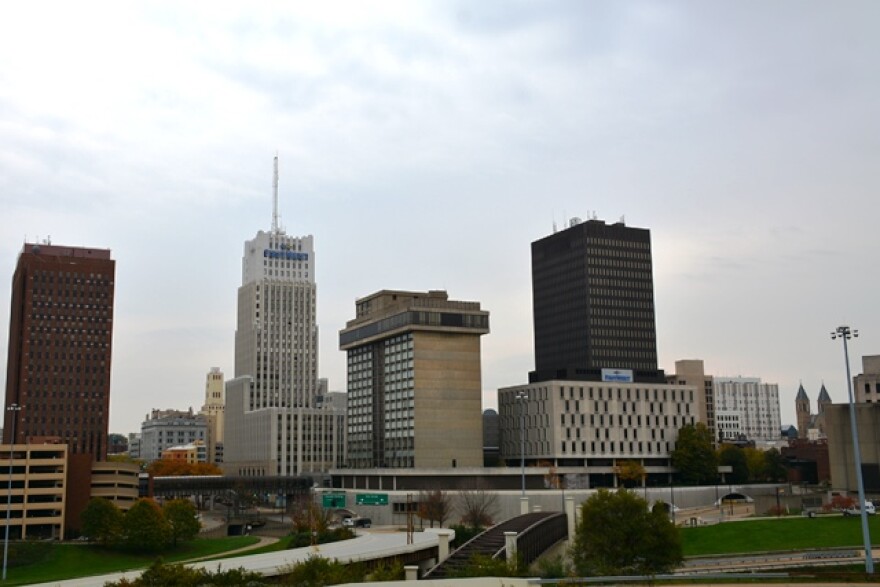by Nick Castele
Next Tuesday, voters in Akron will pick the city’s fourth mayor in less than a year.
The sudden resignation of longtime mayor Don Plusquellic this year set off a scramble at City Hall. His successor resigned after a week, and the next mayor said he planned go back to his old job on city council at the end of the year.
Now there are three men running in the general election to take the job. In interviews with ideastream, they faced questions about similar challenges: how to balance serving residents, attracting development and paying for looming major financial obligations.
Republican mayoral candidate Eddie Sipplen says when he rides his motorcycle through Akron, he sees despair. More than one in four people live in poverty in the city. Sipplen is promising new investment in Akron’s neighborhoods.
“If there are abandoned houses, well, we’re going to take them and get them torn down, that's going to help reduce crime rates,” he says. “We’re going to put in green areas and make it possible for homeownership in a lot of these neighborhoods.”
But alongside that message, Sipplen is also calling for fiscal restraint, saying the city needs to focus on needs, not wants. During a recent debate, he said he’d reevaluate major city-run amenities like the Akron-Fulton airport.
Sipplen is an attorney who has represented clients in criminal and civil rights cases. He says there’s a divide between law enforcement and residents, and he’s proposing a city human rights commission and independent police auditor.
“What I would tell you is that we’re one incident away from being a Baltimore or Ferguson. That’s reality,” he says. “But I can applaud the chief for his efforts to increase better community and police relationships.”
The Democratic candidate for mayor is Daniel Horrigan, who’s campaigning on his record as an Akron city councilman and, for the past eight years, as Summit County’s clerk of courts.
Horrigan says he’ll push for changes to an agreement with the federal government that requires the city to make $1 billion in improvements to its sewer system to stop rainwater and sewage from polluting waterways. Akron is borrowing money to pay for the project, and sewer rates have been going up.
“It affects economic development, it affects seniors,” Horrigan says. “It affects people that maybe want to move into the city of Akron. You can’t have a sewer bill or a water bill that is so high that it makes it unattractive for people to come into the city.”
Horrigan says he wants to pursue what he calls “green solutions,” channeling rainwater into the ground rather than into the sewers.
To tackle city financial needs, Horrigan says he’s not ruling out an increase in the city income tax. And he says he’ll form a panel of business and community leaders to examine the city budget and operations.
He says he’ll take a collaborative approach in developing city neighborhoods.
“Because I never think you want a heavy-handed approach where we come in and say, okay, we’re going to do all this and your input doesn’t matter,” he says. “That’s not the approach. I think you want it to coem from more of an organic—because you get better ownership.”
There’s one more candidate in this race: Bill Melver, a retired General Electric engineer who's running as an independent. He touts his business career and promises to focus on fighting poverty. He says he’s seen Akron change since he moved here with his family in 2000.
“I just felt like the city deserved better leadership,” he says. “A different kind of leadership. One that is not politically driven. One that is more business driven.”
There’s no independent public polling in this election, but Horrigan is winning the money race. He’s spent $231,000 dollars—that’s more than both of his two opponents combined. And the Akron Beacon Journal reports an outside business and civic group has spent more than $400,000 backing Horrigan.
Stephen Brooks is a professor at the Bliss Institute of Applied Politics at the University of Akron. He says with highly-recognizable Don Plusquellic not in the race, this is a Republican candidate’s best chance in years to win votes in a largely Democratic city.
But Brooks says Horrigan still has the wind at his back in this race, because in the Democratic primary, he gained support from the voters and businesses who backed Plusquellic.
Brooks says one difference, though, was that fewer voters turned out this year compared with elections that—for better or worse—focused on Plusquellic’s personality.
“And if you accept my argument that excitement and argument and flame-throwing is what gets people really excited and out for elections,” Brooks says, “then it’s going to be hard to get them out when you’re talking about how to fix a sewer.”
Nevertheless, Akron voters still have time to turn out in this first mayoral race in decades with no Don Plusquellic on the ballot.




